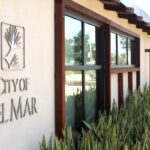VISTA — A heated debate over the future of transportation and who represents the city on the board of directors of the San Diego Association of Governments ended without a selection during the City Council’s Dec. 13 meeting.
Newly elected Mayor John Franklin presented a slate of selections for the City Council members to represent the city, with the big fight being over SANDAG and its controversial $172 billion Regional Transportation Plan.
Franklin appointed himself as the primary representative, but the three Democrats — Corinna Contreras, Katie Melendez and Dan O’Donnell — wouldn’t sign off, leaving the city without representation for the time being.
Prior to Franklin’s slate presentation, Contreras tried to nominate Melendez as the primary. However, Franklin said under the city’s charter and state law, only the mayor has the authority to put forward a slate.
However, the three Democrats are expected to bring back an ordinance in January to override the mayor’s authority to determine who presents the slate. Vista is likely to not have a representative through at least January.
“I am deeply concerned about a 5 cent-per-mile charge and what that would mean for the poorest members of our community,” Franklin said, referring to the controversial road user charge in the transportation plan. “I will not apologize for the fact that I have been a vocal critic of the road user charge.”
Councilman Joe Green supported Franklin.
One of the sticking points between Franklin and his Democratic colleagues was the widening of state Route 78 to include carpool lanes and the road user charge, a per-mile fee. Franklin supports widening the 78 and is against the road charge, while Melendez said she would not support the widening of the 78 but would bring a “balanced” approach to get the public more excited about active transportation.
Franklin, though, said he would not put a slate forward with someone who supports the road user charge. Melendez did not state any opposition to the road charge.
“I believe I have the pull to bring the community into these discussions,” she said.
Contreras said she’s tracked SANDAG through her job as a policy advocate for the Climate Action Campaign. The organization has come under scrutiny for accepting funding from local governments while also lobbying for climate initiatives, although it is unclear if the nonprofit has accepted any funds from SANDAG.
The CAC also supported the effort to put a half-cent tax measure on the ballot in November, but it failed to get the required number of signatures. A coalition of labor unions, climate groups and at least one current SANDAG contractor has said it will attempt to get the measure on the 2023 or 2024 ballot.
Contreras also said she has not seen any urgency from former Mayor Judy Ritter, who was the previous Vista representative, and Franklin. She said SANDAG needs a more comprehensive strategy to provide equity and that electric vehicles and widening the 78 won’t solve the problem.
“We have deep pockets of poverty here in Vista that makes it difficult for people to have a vehicle,” she said. “They also want the freedom of choice and to go to the grocery store without using their car and use micro transit because we have a plan in the city that is matching up with the regional plan and we’re bringing more funding.”
Those critical of SANDAG’s plan have pushed back against the cost, road charges, potential tax increases for county and city of San Diego residents, managed (toll) lanes to push people onto transit.
However, the transit improvements in North County, according to the plan, are limited. SANDAG will double-track the Coaster line, known as the Los Angeles-San Luis Obispo-San Diego (LOSSAN) corridor, double-track the Sprinter line and extend it to the Westfield mall in Escondido.
Other parts of the plan include transit hubs, flexible fleets and more with the goal being to increase ridership to 10%.
However, the funding is also a challenge. Del Mar City Councilwoman Terry Gaasterland said in a recent interview the plan is a “money grab” for San Diego to boost its transit options.
The board majority, meanwhile, has it wants to make transit “free for all” by 2030, thus eliminating between $12 billion to $21 billion in revenue from passenger fares, along with eliminating toll fares from the Southbay Expressway, which removes at least $1 billion from funding toward the plan.



